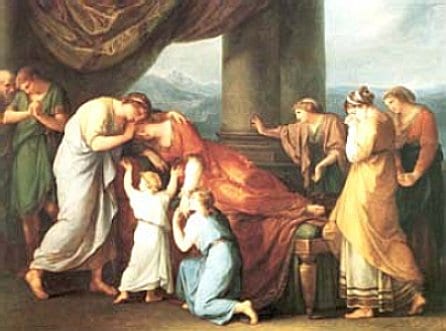Methought I Saw My Late Espoused Saint
Back to John Milton
Methought I Saw My Late Espoused Saint is a sonnet composed by John Milton, a poet during the 1600’s who is most famous for his epic, Paradise Lost. Also known as Sonnet XXIII, the sonnet was created around 1658 following the death of his second wife, Katherine Woodcock, who died in childbirth.
 |
| The death of Alcestis |
The Poem
Methought I saw my late espoused Saint
Brought to me like Alcestis from the grave,
Whom Jove’s great son to her glad husband gave,
Rescued from death by force though pale and faint.
Mine as whom washed from spot of childbed taint
Purification in the old law did save,
And such as yet once more I trust to have
Full sight of her in heaven without restraint,
Came vested all in white, pure as her mind:
Her face was veiled, yet to my fancied sight
Love, sweetness, goodness in her person shined
So clear, as in no face with more delight.
But O, as to embrace me she inclined,
I waked, she fled, and day brought back my night.
Interpretation
A short interpretation of the poem details how a man dreams of a woman coming back from the grave in a dream and when she is just about to embrace the narrator he wakes losing her. Milton makes reference to Alcestis, a figure found in one of the great tales of Hercules. Hercules is told to have snatched Alcestis from Hades after her untimely demise and brought her back to her husband Admetus. Like Alcestis, Milton’s “saint” is veiled, though this could be more or less due to his blindness at the time of his second marriage. His blindness and not having actually seen his late wife, may also be why instead of describing ways that her beauty shines, or remarking about recognizing her face, he details that it was her characteristics that shone from her and not actually her physical characteristics. Evidence that this could be his second wife is seen in line five, where he divulges how his wife died in labor.
The last two lines are the most important as not only do they include the twist seen in many English sonnets, but they show more of Milton’s emotions and how his blindness has affected him.
He details how when he wakes from the dream that day brings back his night. This works two-fold as one can interpret it from an emotional level and physical level, and another from a more metaphysical level. The first is due the actual daybreak awakening him to the world where his wife is deceased. This brings back his, “night” or more aptly named his sorrow for his latest wife. The metaphysical level is more interesting as how it pertains to Milton’s blindness. Since he is blind, the natural world is dark to him, but in the subconscious realm of dreams he has vision.
References
Death of Alcestis. Wikimedia Commons
https://sites.udel.edu/britlitwiki/files//2018/06/FileAlcesti.jpg
